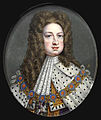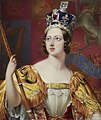House of Hanover
The House of Hanover or English " House of Hanover " or " The Hanoverians " was a royal dynasty of German descent that succeeded the House of Stuart between 1714 and 1901 and held the royal dignity of Great Britain . This epoch is therefore also dubbed “ Hanoverian England ” in English historiography .
history
The house of Hanover is the younger line of the Guelph family from its second dynasty Welf- Este . The older line were the dukes of Braunschweig-Wolfenbüttel . The Electorate of Braunschweig-Lüneburg , ruled by the House of Hanover , emerged in 1692 from a number of territories of the Holy Roman Empire : the Principality of Calenberg , the Principality of Grubenhagen , the County of Hoya , the Duchy of Saxony-Lauenburg , the Principality of Lüneburg (from 1705), the Duchy Bremen and the Duchy of Verden (from 1715). Calenberg, Grubenhagen and Lüneburg were, like Braunschweig-Wolfenbüttel, nominally partial principalities of the Duchy of Braunschweig and Lüneburg, formed in 1235 .
Ernst August von Calenberg-Grubenhagen was made electoral prince of Hanover by Emperor Leopold I in 1692 . His wife Sophie von der Pfalz , daughter of the Palatinate Elector and Bohemian "Winter King" Friedrich from the Wittelsbach family and Elisabeth Stuart , Princess of Great Britain and Ireland from the Stuart family , became the designated heir to the British throne through the Act of Settlement from 1701 Monarchy appointed as the future successor of her direct cousin Anne Stuart , whose numerous children had all died in childhood by this time. Sophie died in June 1714, Queen Anne only two months later. This therefore followed Sophie's eldest son, Elector Georg , to the throne in London.
The first two Hanoverian regents on the English throne, George I and George II , were born and raised in Hanover . Under George III. Great Britain lost a large part of the North American colonies in the American War of Independence (1775–1783). The coalition wars against France, which lasted more than two decades, ended in 1815 with Napoleon's defeat in the Battle of Waterloo ; British dominance on the world's oceans was also expanded and the British Empire expanded significantly on other continents.
Were the bearers of the British Crown in personal union also Elector of Brunswick-Lüneburg and after the fall of the Holy Roman Empire in 1806 kings of the sovereign kingdom of Hanover after George IV. As the then Prince Regent , the Hanoverian lineage country had declared 1814 the independent Kingdom. The personal union ended in 1837, when the throne of Hanover, according to Sali's law, passed not to Queen Victoria , but to her uncle, the Duke of Cumberland and now King Ernst August I of Hanover . The rule of the House of Hanover over the Empire lasted until Victoria's death in 1901.
Due to the Prussian annexations in the wake of the war of 1866 , the Kingdom of Hanover became a Prussian province and the royal family went into exile in Austria. However, it returned to the throne in the Duchy of Braunschweig from 1913 to 1918 .
| Kingdom of Great Britain | ||
| Surname | Domination | Remarks |
|---|---|---|
| George I. | 1714-1727 | |
| George II | 1727-1760 | |
| George III | 1760–1820 (The Kingdoms of Great Britain and Ireland united to form the United Kingdom of Great Britain and Ireland in 1801. ) | |
| United Kingdom of Great Britain and Ireland | ||
| Surname | Domination | Remarks |
| George III | 1760-1820 | |
| George IV | 1820-1830 | |
| William IV | 1830-1837 | |
| Victoria | 1837-1901 | |
When Victoria died in 1901, followed the House of Hanover with her son Edward VII. , The House of Saxe-Coburg and Gotha , named after her husband, Prince Albert of Saxe-Coburg and Gotha . Her grandson George V changed the name of his house to Windsor in 1917 . The British Queen Elizabeth II is a direct descendant of George I, because the Act of Settlement requires the monarch to be a Protestant descendant of his mother, Electress Sophie von Hannover .
George I (1714-1727)
George II (1727-1760)
Friedrich Ludwig von Hannover , Prince of Wales (1707–1751)
George III (1760-1820)
George IV (1820-1830)
Wilhelm IV. (1830-1837)
Victoria (1837-1901)
| Surname | Domination | Remarks |
|---|---|---|
| George III | 1814-1820 | |
| George IV | 1820-1830 | |
| William IV | 1830-1837 | |
| Ernst August I. | 1837-1851 | |
| George V. | 1851-1866 |
Coat of arms of the Kingdom of Hanover 1837
Ernst August I , King of Hanover (1771–1851)
George V , King of Hanover (1819–1878)
| Surname | Period | Remarks |
|---|---|---|
| George V. | 1866-1878 | |
| Ernst August II. Crown Prince of Hanover | 1878-1913 | |
| Ernst August III. Prince of Hanover | 1913–1953, ruling Duke of Braunschweig from 1913 to 1918 | |
| Ernst August IV Prince of Hanover | 1953-1987 | |
| Ernst August V. Prince of Hanover | 1987 until today |
Memoria
Numerous provinces and places in the British colonies and protectorates were named after the former British royal dynasty or its members , including today's US state of Georgia , the city of Hanover (New Hampshire) , the city of Hanover (Pennsylvania) , Hanover County and Caroline County (Virginia) , Brunswick County (Virginia) , Brunswick County (North Carolina) , Hanover Township in Illinois and places called Georgia in New Jersey, Vermont, Arkansas and South Dakota, and seven cities in the USA and Canada after Queen Charlotte , in Canada also includes the province of New Brunswick , the city of Hanover (Ontario) , the city of Guelph in Ontario and the city of Victoria (British Columbia) , in South Africa the city of Hanover (South Africa) , in Australia the state of Victoria and the city of Adelaide , in Great Britain six Places and in the USA thirteen cities and twelve districts called Brunswick, furthermore one each in Australia and New Zealand and over fifty places worldwide called Victoria. There are also numerous streets and squares such as Hanover Square in the City of Westminster and Brunswick Square in Camden , London, Hanover Square in downtown New York City and Hanover Square in Syracuse (New York) . Streets in the center of Brisbane , Australia, are named after members of the House of Hanover, parallel to Queen Street after the female, perpendicular to it after the male.
The Georgian architecture continues to characterize towns and rural places all over the world.
See also
literature
- When the royals came from Hanover . 4 volumes. Sandstein, Dresden 2014, ISBN 978-3-95498-103-8 .
- Ronald G. Asch (Ed.): Hanover, Great Britain and Europe. Experience area personal union 1714–1837 (= publications of the Historical Commission for Lower Saxony and Bremen 277). Wallstein-Verlag, Göttingen 2014, ISBN 978-3-8353-1584-6 .
- Jeremy Black: The Hanoverians. The History of a Dynasty. Hambledon Continuum, London 2004.











